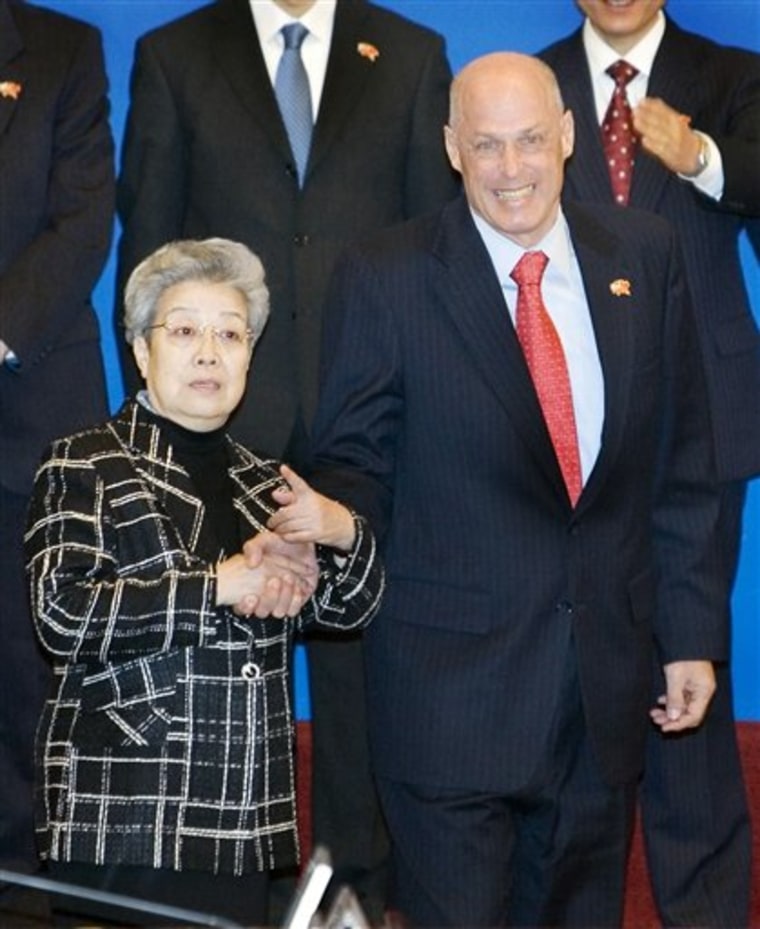A top Chinese trade negotiator warned of retaliation should Congress try to block the nation’s imports as U.S. and Chinese officials voiced sharp differences Wednesday over what has led to Beijing’s massive trade surplus.
A two-day China-U.S. Strategic Economic Dialogue, held outside Beijing, opened amid rising frustration by Washington over what it sees as unfair trade barriers. China has implied that any protectionist measures from the U.S. would cut both ways.
U.S. officials say China must allow greater access to its markets, while Beijing says it is not to blame for America’s hunger for cheap, Chinese-made goods.
Vice Premier Wu Yi, who led the Chinese delegation, insisted that Beijing had not sought large trade surpluses and that the U.S. could boost exports by relaxing restrictions on high-tech goods.
“To address the China-U.S. trade imbalance requires the concerted efforts of both sides,” Wu said.
She reiterated Chinese concerns about the roughly 50 China-related trade bills introduced this year in Congress, hinting that China would likely retaliate if its interests were harmed.
“I need to be quite candid about this: If these bills are adopted, they will severely undermine U.S. business ties with China,” Wu said.
Washington’s trade deficit with China appears set to surpass last year’s record $233 billion, according to U.S. Commerce Department figures. That has amplified calls in Congress for punitive measures on Chinese imports if Beijing fails to let its currency appreciate.
Critics claim that Beijing keeps the yuan undervalued, giving Chinese exports an unfair advantage and inflating the nation’s trade surplus. China began allowing a slow rise in the yuan’s value in July 2005. Since then, it has appreciated 8.9 percent against the dollar in tightly controlled trading.
U.S. Treasury Secretary Henry Paulson reiterated calls for a faster yuan appreciation, saying it would offer China more effective leverage to battle rising inflation and asset bubbles amid signs that China’s economy is overheating.
“A more flexible exchange rate policy is especially important to China now, given these risks,” Paulson said.
Speaking shortly afterward, Commerce Vice Minister Chen Deming flatly rejected a rapid appreciation for the yuan, saying it was “simply not a scientific approach.”
Beijing is more concerned about the dollar’s decline, which Chen said has threatened to push up prices of strategic goods such as gold and oil. That would damage countries like China, which maintain giant U.S. dollar-denominated foreign currency reserves, Chen said.
“That’s why I sincerely wish to see a scenario where the U.S. economy strengthens and the U.S. dollar strengthens,” said Chen, who is expected to become commerce minister soon.
The dollar has fallen sharply against major currencies this year, sinking to a record low against the euro in late November and sliding nearly 7 percent against the Japanese yen, 10 percent versus the Indian rupee and 14 percent against the Canadian dollar.
China announced Tuesday that its global trade surplus totaled $26.28 billion in November, showing continued strong foreign demand for low-cost Chinese goods despite a string of product recalls on items ranging from toys to tires.
U.S. Commerce Secretary Carlos Gutierrez appeared to dismiss Wu’s call for lifting high-tech export limits, saying the sector accounted for a “minuscule amount” of trade. While China is currently the fastest growing market for U.S. exports, we “clearly need more” market access, he said.
The meetings, which close Thursday, followed a similar forum in Beijing on Tuesday that produced wide-ranging agreements intended to boost Chinese tourism in the U.S., tighten safeguards for Chinese products and open mid-sized Chinese cities to American imports.
The earlier talks also began contentiously, with Gutierrez saying Wu expressed “very strongly” her displeasure with a recent case on intellectual property rights that the U.S. took to the World Trade Organization.
Gutierrez on Wednesday called on China to end its annual quota on foreign film imports, following reports — denied by Chinese officials — that Beijing was taking new steps to shut overseas movies out of its markets.
“The problem is that there is a limit and we would like to get that lifted,” he said.
China generally limits foreign film imports to about 20 per year to protect domestic film makers. Last week, the Hollywood trade magazine Variety reported that China was banning all Hollywood movies for three months. Chinese officials responsible for film imports said they had received no such instructions.
